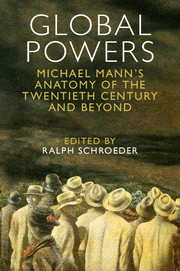Book contents
- Frontmatter
- Contents
- List of contributors
- 1 Introduction
- Part I Theory and history
- 2 The evolution of the sources of social power, and some extensions
- 3 The return of big historical sociology
- 4 Taming the chief: from evolutionary theory to political ideology
- Part II Political, economic, military and ideological questions
- Part III American exceptionalism
- Part IV Empire
- Part V Response
- Index
- References
2 - The evolution of the sources of social power, and some extensions
from Part I - Theory and history
Published online by Cambridge University Press: 05 April 2016
- Frontmatter
- Contents
- List of contributors
- 1 Introduction
- Part I Theory and history
- 2 The evolution of the sources of social power, and some extensions
- 3 The return of big historical sociology
- 4 Taming the chief: from evolutionary theory to political ideology
- Part II Political, economic, military and ideological questions
- Part III American exceptionalism
- Part IV Empire
- Part V Response
- Index
- References
Summary
Historical sociology is, according to the famous characterization of Reinhard Bendix, a chimera of research programmes, most of which took many of their questions from Marx and most answers from Weber. Provided that creativity is allowed in formulating both questions and answers, this characterization fits well with the possibly greatest of living historical sociologists, Michael Mann, who has recently completed his five millennium-long journey from the emergence of the state to our time, with two new volumes in The Sources of Social Power series.
In what follows I will first briefly describe what is specific in Mann's neo-Weberian approach to historical development and particularly in his approach to power. I will then highlight some of the historical narrations in each of the four volumes. My focus will be on the two recent volumes, but the two earlier volumes cannot be completely neglected because they provide the context for the two new books and their analysis also shows that Mann's model of analysing power and particularly the way he uses it has gone through some transformation in the course of writing the series. Finally, I will recall the theoretical aspects of Mann's work and make two interventions. I will ask, first, whether his theoretical approach could be made more systematic and developed further, and, second, whether his classification of power sources is the most suitable one for the purposes of the analysis of our time or whether it could be adjusted in one way or another. The interventions include discussion on the relationship of Mann's approach to Foucault's analytics of power and an attempt to expand Mann's most important theoretical tool, the IEMP model (ideological, economic, military and political power sources), to a NACEMP model (natural, artefactual, cultural, economic, military and political power sources) with an even broader scope.
What is power and how does the IEMP model work?
Mann is not a grand theorist. He finds it difficult to understand the use of theory that has not emerged in the context of empirical social research. Therefore, his concepts tend to be methodological ideal types in nature and oriented towards a middle-range type of interpretation of social processes. Yet he cannot avoid social ontology completely, even if he tries to keep his commitments on that level few, abstract and open to reinterpretation.
- Type
- Chapter
- Information
- Global PowersMichael Mann's Anatomy of the Twentieth Century and Beyond, pp. 11 - 37Publisher: Cambridge University PressPrint publication year: 2016
References
- 10
- Cited by



